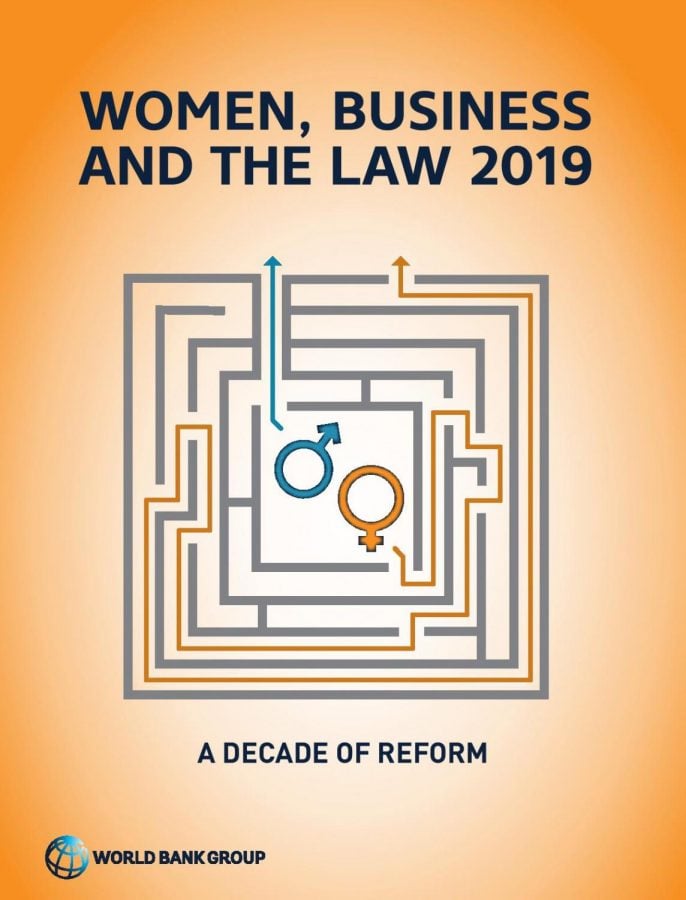World Bank: Women face legal discrimination in workforce
Women around the world generally only receive three-quarters of the legal rights that men have, according to a report released by the World Bank in late February.
Though several regions have seen improvements in the last decade, according to the report, a lack of equivalent rights as men constrains the ability of women around the world to get jobs or start businesses.
“If women have equal opportunities to reach their full potential, the world would not only be fairer, it would be more prosperous as well,” World Bank Group Interim President Kristalina Georgieva said in a news release. “Change is happening, but not fast enough, and 2.7 billion women are still legally barred from having the same choice of jobs as men. It is paramount that we remove the barriers that hold women back, and with this report we aim to demonstrate that reforms are possible, and to accelerate change.”
Sub-Saharan Africa saw the most reforms over the past decade, according to the report. The region introduced 71 reforms, more than half related to women’s ability to start jobs and have more say over getting married.
“Though this is in part a measure of the large number of economies in the region, it also demonstrates the significant room for improvement these economies had from their baseline,” Sarah Iqbal, one of the authors of the report, wrote in an email to the DePaulia. “In fact, Sub-Saharan Africa had the third-highest increase in the index’s average regional score, moving from 64.04 to 69.63 over 10 years.”
In addition, six countries can now say they received a perfect score from the World Bank: Belgium, Denmark, France, Latvia, Luxembourg and Sweden. Receiving a perfect score means that the countries give women and men equal rights, according to the World Bank. No country received such a score in the report from a decade ago.
The U.S. has a score of 83.75, which Ann Russo, the director of DePaul’s Women’s Center, said is not a surprise.
“The U.S. views itself as exceptional in terms of equality and equity,” she told the DePaulia. “But it’s not true.”
Russo said that people tend to forget that women, especially women of color and women from immigrant communities, do not always receive equal pay or treatment in the workplace.
This is because of the systems of power that have been in place for centuries, including patriarchy, capitalism and white supremacy, all of which rely on inequality in order to exist, Russo said.
Iqbal said that one reason the U.S. did not receive a perfect score is the lack of paid family leave, including paid maternity, paternity or parental leave.
“The U.S. is the only high-income country without paid family leave,” she said. “However, the U.S. is taking concrete steps towards establishing paid family leave, and there are several proposals currently being discussed.”
These systems are not unique to the U.S., meaning that all countries have to combat them to make progress toward equal rights for women.
Though there has been progress overall — the global average has gone from a score of 70 to 75 — not all countries are playing a role in these advances. Fifty-six countries did not have any reforms at all to improve women’s equality of opportunity since the 10-year period described in the report began. The country’s region and economic conditions did not matter in this regard. In addition, improvements came slowest in the area of property rights, meaning that women are limited in their rights to manage their families’ assets.
The pace of reform is slowest in managing assets because it covers property and inheritance law, which are very slow areas to reform in general, Iqbal said.
“It does affect women’s entrepreneurship, because property rights relate to women’s ability to get finance to start and grow businesses,” she wrote. “The link here is collateral. Banks, in particular in developing countries, use property as collateral for loans. And without property rights, women are at a disadvantage when it comes to getting bank financing for business purposes.”
In order for women to move forward, regardless of where in the world they are, they can do more to organize collectively to push for change, according to Russo.
“Organizing, speaking out, hoping for change — it creates more pressure [for more accountability],” she said.







